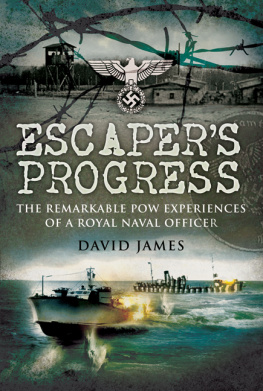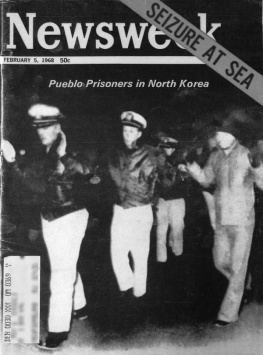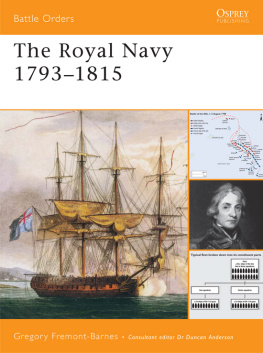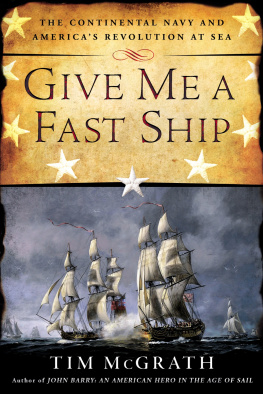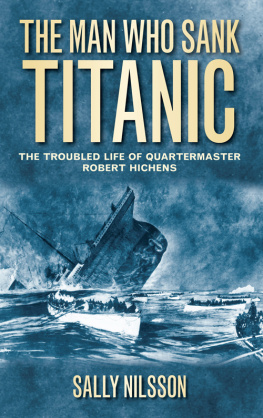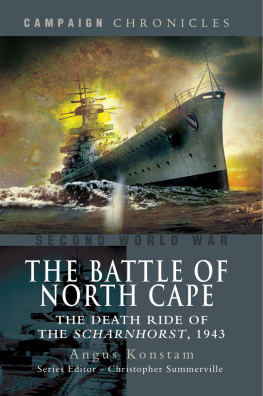
Originally published as A Prisoners Progress in Blackwoods Magazine in
December 1946 and Jan/Feb 1947. In book form: 1st Edition Blackwoods
1947; 2nd Edition Hollis and Carter 1954; US Edition (as Escapers
Progress) W.W. Noston N.Y. 1955; 4th Edition Brown and Watson 1958;
Corgi Edition 1978; David Guthrie-James 1986.
This edition published in Great Britain in 2008 by
Pen & Sword Maritime
an imprint of
Pen & Sword Books Ltd
47 Church Street
Barnsley
South Yorkshire
S70 2AS
Copyright David James 2008
ISBN 978 1 84415 843 0
ePub ISBN: 9781844684465
PRC ISBN: 9781844684472
The right of David James to be identified as Author of this Work has
been asserted by him in accordance with the Copyright, Designs and
Patents Act 1988.
A CIP catalogue record for this book is
available from the British Library.
All rights reserved. No part of this book may be reproduced or
transmitted in any form or by any means, electronic or mechanical
including photocopying, recording or by any information storage and
retrieval system, without permission from the Publisher in writing.
Typeset in Linotype Centennial by
Phoenix Typesetting, Auldgirth, Dumfriesshire
Printed and bound in England by
Biddles, Kings Lynn
Pen & Sword Books Ltd incorporates the Imprints of Pen & Sword
Aviation, Pen & Sword Family History, Pen & Sword Maritime, Pen &
Sword Military, Wharncliffe Local History, Pen & Sword Select, Pen &
Sword Military Classics, Leo Cooper, Remember When, Seaforth
Publishing and Frontline Publishing
For a complete list of Pen & Sword titles please contact
PEN & SWORD BOOKS LIMITED
47 Church Street, Barnsley, South Yorkshire, S70 2AS, England
E-mail:
Website: www.pen-and-sword.co.uk
Contents
Preface
WHEN it comes to acknowledgements, I have difficulty in knowing where to start, so many people there are to thank. Let me begin by mentioning Messrs. Hardy, Harrison and Cartwright, Evans, Hervey and Hugh Durnford, authors of the escape classics of the First World War. I read all their books at my preparatory school and was enthralled by their stories. It is the hope that a future generation of boys may be intrigued by my own escape that has induced me to add it to the list. Not only that, though. Both in spirit and technique, the above-named were the pioneers of escape, and it was largely their inspiration that helped so many of us to get away between 1939 and 1945. As long as there are wars there will be prisoners. Perhaps the boy who reads this book may find himself at some future date languishing in the hands of the Lilliputians, in which case my work, too, may be of interest and use.
Anyone who reads this book will find that there were many people in the camp without whose help I would never have got clear. Such men, for example, as George Beale, whose sympathy, help, and sound judgement were at everybodys disposal; Archie Cheyne and Johnny Pryor, always to the fore in any scheme, and both deserving to get away themselves; Lieutenant-Commander OSullivan and Billy Hussey, expert forgers may they never turn their talents to 5 notes! David Jolly, ex-C.I.D. man, whose journey along the Baltic coast gave me so much valuable information; and Frank Jackson, whose encyclopaedic knowledge of languages, inventive imagination, and ready wit not only got me home but also provided me with a trade name that will be remembered long after my own is forgotten.
Finally, my thanks to everyone in Marlag (O) for being such staunch and cheerful friends in dark times. It is no mean achievement that all my memories of a prison camp should be pleasant ones.
D.J.
Introduction
by Eric Williams
SHORTLY after I arrived back from Germany in 1943, I was posted to a clandestine establishment in a country house not far from London where, it was thought, my recent experiences would be of value. It was there that I heard for the first time the fascinating story of a certain naval officer, explicitly named, who had bluffed his way from Marlag Nord to Sweden.
The fact that he had taken more or less the same route as we had done made his escape more than interesting to us. That he had made a prior escape in full Royal Navy uniform with the mere addition of a shoulder flash which read KRALOV BULGRSKI VOYENNO-MRSKOI FLOT or ROYAL BULGARIAN NAVY was a good joke against the Germans. That his papers had borne that unequivocal name we just could not believe; it seemed too good to be true. But such it was, as I discovered when I read David Jamess report.
This masquerade is in the direct tradition of the great naval escapes of the Napoleonic Wars. It has more affinity perhaps with the lighthearted escapes of the First World War than it has with the highly organized affairs of the latter part of the recent conflict. In this book you will find nothing of the Gestapo, nothing of torture or the threat of execution. Hardship and privation are here for they are the price the escaper is prepared to pay for his freedom, and how cheerfully David James puts down his money. The impression I gather from these pages is of a resourceful and likeable young man whose ready wit and pleasant manner proved a sound defence against rising suspicion. Time and again the reader feels This is it! but, incredibly, the bluff succeeds, the forged papers are handed back and the Bulgarian officer is allowed to continue on his way.
David James was certainly lucky, every successful escaper owes his freedom to his luck, but he was also shrewd and full of guts. Above all he was a good loser, and when in the earlier escape attempt he was recaptured and reasonably treated this was, I cant help thinking, largely because he himself was reasonable and obviously expected to be treated so.
Escapers Progress was written shortly after the war. Now, when the events of which it tells can be seen in their true perspective, I am certain that it will be enjoyed by everyone who believes in that indestructible British spirit which can be so clearly recognized between its pages.
Chapter One
Capture
FROM early 1941 until February 1943 I was in M.G.B.s based at Felixstowe. It was a grand two years. I was fortunate enough to be in the flotilla of the greatest of the early Coastal Force leaders that superb seaman, the late Lieutenant-Commander Robert Hichens, D.S.O. (bar), D.S.C. (two bars), and under his command there was never a dull moment. Nevertheless, I must resist the urge to write of those days, for they form part of a different story, and one already well told by Hichens himself in We Fought Them in Gunboats, and by Peter Scott in The Battle of the Narrow Seas.
During the first two months of 1943 life for me personally, seemed to have reached a peak. My boat was working well, operations were plentiful and varied, friends used to come down almost every weekend from London to stay away from the air-raids, the duck were flighting with beautiful regularity into the salt marshes of the Orwell, and the pub close by was plentifully stocked with beer. Professional, social, and sporting life boomed, in fact, and there seemed no reason why the halcyon days should ever end. True, there was always the possibility of being knocked out, but in the armed forces it did not pay to consider possibilities like that. As for being captured, being suddenly cut off from this busy, happy life, that was obviously absurd.
Saturday, 27th February, 1943, was a busy day. My boat was inspected in the morning by a visiting Admiral. I was playing in a rugger match in the afternoon, and a relative was coming down to spend the weekend. At lunch-time I heard we were going to sea, so had to make some emergency arrangements. As soon as the match ended, a waiting taxi took me to the station, where I met my aunt. I just had time for a quick cup of tea; then, with a See you for breakfast tomorrow, I was off. As I bade her farewell, I felt most strongly that I would not see her next day. This was the only time that I ever had such a feeling, and I have never been able to think of any explanation for it.
Next page
